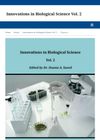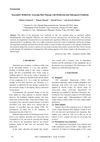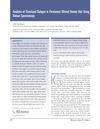 1 citations,
October 2013 in “Actas Dermo-Sifiliográficas”
1 citations,
October 2013 in “Actas Dermo-Sifiliográficas” Customized medications made through compounding can be beneficial for various skin conditions but require careful regulation and collaboration between doctors and pharmacists.
 December 2024 in “Deleted Journal”
December 2024 in “Deleted Journal” New therapies show promise for wound healing, but more research is needed for safe, affordable options.
 183 citations,
January 2018 in “Cosmetics”
183 citations,
January 2018 in “Cosmetics” Essential oils in cosmetics can offer benefits but may cause allergies and should be used carefully.
 434 citations,
October 2003 in “PTR. Phytotherapy research/Phytotherapy research”
434 citations,
October 2003 in “PTR. Phytotherapy research/Phytotherapy research” Natural products in cosmetics are beneficial for skin and hair care with low toxicity.
 July 2024 in “Revista Científica de Estética e Cosmetologia”
July 2024 in “Revista Científica de Estética e Cosmetologia” The babassu fiber exfoliating product for hair loss should be stored in a cool place to stay effective.
 17 citations,
January 2021 in “Dermatology and Therapy”
17 citations,
January 2021 in “Dermatology and Therapy” Laser-assisted drug delivery has shown improved treatment outcomes for skin conditions and has potential to reduce side effects and treatment time.
3 citations,
September 2021 in “Data in brief” Bleaching hair changes its structure and weakens it, which is important for understanding hair damage and creating treatments.
 July 2024 in “Science and Culture”
July 2024 in “Science and Culture” Thuja orientalis L. has many health benefits and could be used in new medicines.
34 citations,
January 2022 in “Molecules/Molecules online/Molecules annual” Natural ingredients in cosmeceuticals are beneficial for skin and hair health with few side effects.

Neem leaf extract combined with eucalyptus and lemongrass oils can effectively treat Tinea capitis.
 3 citations,
April 2022 in “Farmacia”
3 citations,
April 2022 in “Farmacia” Certain foods and supplements can help treat skin diseases alongside medication.
 39 citations,
June 2017 in “Journal of Applied Research on Medicinal and Aromatic Plants”
39 citations,
June 2017 in “Journal of Applied Research on Medicinal and Aromatic Plants” Plant-based ingredients are effective and safe for modern skincare products.
 22 citations,
February 2002 in “Planta Medica”
22 citations,
February 2002 in “Planta Medica” Compounds from Angelica koreana roots, especially osthenol, could be effective for treating conditions like prostate disease and hair loss.
 1 citations,
May 2022 in “Scientific African”
1 citations,
May 2022 in “Scientific African” Oleogels made from Cedarwood and Rosemary oils can enhance hair growth, but combining both oils doesn't increase the effect.
Curcuma aeruginosa Roxb. may help treat hair loss by affecting specific biological pathways.
 October 2024 in “International Journal of Molecular Sciences”
October 2024 in “International Journal of Molecular Sciences” Rosa rugosa extract promotes hair growth and could be a natural treatment for hair loss.
 59 citations,
May 2014 in “Expert Opinion on Therapeutic Targets”
59 citations,
May 2014 in “Expert Opinion on Therapeutic Targets” The document concludes that targeting 5α-reductase, the androgen receptor, and hair growth genes, along with using compounds with anti-androgenic properties, could lead to more effective hair loss treatments.
 21 citations,
June 2022 in “Molecules”
21 citations,
June 2022 in “Molecules” Perilla frutescens, an East Asian plant, contains 400 bioactive compounds that have various health benefits, including anti-inflammatory, antidepressant, and anticancer effects, and can treat conditions like diabetes, skin allergies, and neurological disorders.
 November 2023 in “Deleted Journal”
November 2023 in “Deleted Journal” Cedrus libani has potential medicinal uses but needs more safety studies.
 205 citations,
September 2018 in “Nutrients”
205 citations,
September 2018 in “Nutrients” Essential oils from Curcuma species, like turmeric, have compounds that can fight inflammation, cancer, and bacteria, and can also stimulate hair regrowth in bald males.
 August 2023 in “International journal of research in Ayurveda and pharmacy”
August 2023 in “International journal of research in Ayurveda and pharmacy” Garudan Kizhangu Ennai may effectively treat alopecia areata but needs more research to confirm its safety and effectiveness.
5 citations,
January 2012 in “International journal of trichology” Chemotherapy-induced hair loss is a major concern, but various treatments show promise in preventing and reversing it.
 9 citations,
June 2014 in “Nutrition and Cancer”
9 citations,
June 2014 in “Nutrition and Cancer” Eclipta alba extract may work as an anticancer agent and help reverse drug resistance.
 56 citations,
January 2004 in “Dermatology”
56 citations,
January 2004 in “Dermatology” Most patients treated with low-dose alpha-interferon for malignant melanoma experienced skin side effects, with hair loss being the most frequent.
1 citations,
January 2012 The CRABP I gene in cashmere goats is highly conserved but has unique features at specific amino sites.
 12 citations,
December 2009 in “Amino Acids”
12 citations,
December 2009 in “Amino Acids” Putting α-methylspermidine on mouse skin can start hair growth.

Lavender is widely used for its calming effects and in beauty products, but its medical effectiveness is not fully proven and not FDA-approved.
 4 citations,
January 2007 in “Sen'i Gakkaishi”
4 citations,
January 2007 in “Sen'i Gakkaishi” Permed hair degrades faster and shows more damage after protease treatment compared to untreated hair.
 45 citations,
December 2006 in “Biopolymers”
45 citations,
December 2006 in “Biopolymers” Permanent waving weakens hair by altering its protein structure.
 April 2012 in “The Journal of Urology”
April 2012 in “The Journal of Urology” Early baldness increases prostate cancer risk, radiotherapy and surgery have similar second cancer rates, and ALA may reduce prostate cancer risk.

























